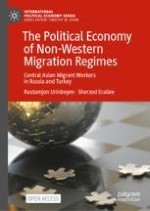This open access book contributes new theoretical and comparative insights on migrant agency, undocumentedness and informality in non-Western, non-democratic migration regimes. The book is conceived as a critical reflection on the contemporary migration regime scholarship, and, more generally, on comparative migration studies, which primarily focus on migrants’ experiences and immigration policies in the context of liberal democracies in North America and Western Europe. Addressing this gap is particularly important when considering the fact that many new migration hubs are nondemocratic, which in turn requires us to revise or produce new frameworks of analysis beyond existing and dominant Western-centric migration regime typologies. This book takes up the case study of Central Asian migrants in Russia and Turkey—two archetypal non-Western, nondemocratic regimes and key migration hotspots worldwide—and investigates how migration governance outcomes are shaped by the informal power geometries and extralegal processes in physical and digital landscapes in which migrant workers, employers, middlemen, landlords, street world actors and street-level bureaucrats negotiate the contemporary migration system. This lively ethnography presents new empirical material, a comparative perspective and methodological tools for studying migrants’ experiences and migration governance processes in non-Western migration regimes.
